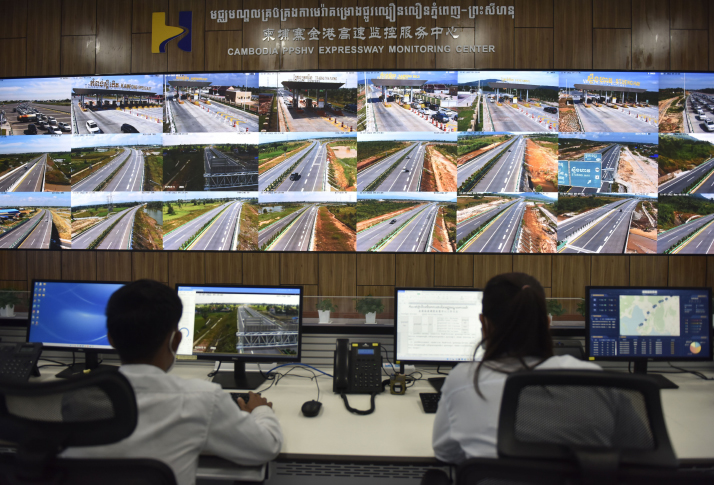| World |
| Asia-Pacific prosperity should not give way to geopolitical rivalry | |
|
|
 Staff members check camera footage at the monitoring center of the China-invested Phnom Penh-Sihanoukville Expressway in Phnom Penh, Cambodia, on November 7 (XINHUA)
With face-to-face global exchanges few and far between following the outbreak of the COVID-19 pandemic, the week spanning November 14 to 19, when Indonesia and Thailand hosted the 17th Group of 20 (G20) Summit and the 29th Asia-Pacific Economic Cooperation (APEC) Economic Leaders' Meeting, respectively, provided rare but intense opportunities for leaders to meet and discuss urgent matters. Asia took center stage during the week, with China's head-of-state diplomacy garnering much attention as President Xi Jinping met with the leaders of a dozen countries during his first trip overseas following the conclusion of the 20th Communist Party of China (CPC) National Congress on October 22. "The Asia-Pacific is no one's backyard and should not become an arena for big power contests. No attempt to wage a new cold war will ever be allowed by the people or by our times," Xi said at the APEC CEO Summit on November 17. During his six-day trip, Xi participated in more than 30 events, "promoting global development and leading global governance, demonstrating China's role as a rational, confident and responsible major country," State Councilor and Foreign Minister Wang Yi told Chinese media on November 19. Together in Asia Some 10 days ahead of the APEC Economic Leaders' Meeting, the First Think Asia Forum took place in Singapore on November 2, where 40 scholars and experts, mainly from Asian countries, discussed Asia's prospects, its security and cooperation mechanisms, as well as the relationship between Asian countries and the rest of the world. In his keynote speech, Singaporean scholar and diplomat Kishore Mahbubani suggested that Asian countries "need to speak up for themselves and give up their psychological dependence on getting ideas from the West." And as the West withdraws from globalization, Asia must take up the baton, he added. "We are seeing the end of the era of Western domination of world history. A different era has begun as Asian countries are returning to their historical place in the global economy. This return of Asia has been a fundamental global shift," the former Singaporean permanent representative to the United Nations said. This year, from the virtual 14th BRICS Summit hosted by China to the Shanghai Cooperation Organization Summit in Uzbekistan's Samarkand to G20 and APEC meetings in Bali and Bangkok, respectively, Asian leaders' active exchanges have paved the way for a post-pandemic synergy among them and beyond. Next year, China will host the Third Belt and Road Forum for International Cooperation, as Xi announced at the APEC gathering, which might further justify the academic consensus that the Asian Century is here. The Asian Century is the projected 21st-Century dominance of Asian politics and culture, assuming certain demographic and economic trends persist. The concept parallels the characterization of the 19th century as Britain's imperial century and the 20th century as the American century. Nevertheless, China-U.S. relations do play a key role in Asia-Pacific prosperity. The international community watched closely as Xi and U.S. President Joe Biden met in Bali on November 14. And even though there are still some hard nuts to crack, their meeting was widely considered as sending a positive, encouraging message to the world. During their meeting, Xi said China-U.S. relations should not be a zero-sum game where one side outcompetes or thrives at the expense of the other and that the world in the 21st century must avoid repeating the mistakes of the Cold War. Biden stated in turn that the U.S. respects China's system, does not seek a new cold war, does not seek to revitalize alliances against China, and has no intention to seek conflict with China or to contain China. Most Asian countries want to have a good relationship with the U.S., China included. The latter's growing market is a key feature in the development strategies of most Asian countries, made possible by China's reform and opening-up policy, U.S. scholar and senior researcher with the Beijing-based Center for China and Globalization David Blair told Beijing Review. But it's impossible to predict exactly what decisions are likely to be made by any American administration, Blair added. Kishore's remarks in his recent interview with India Today echoed Blair's views. "The fundamental thing I keep asking my American friend is, 'what is your long-term strategy?'... He told me one of the fundamental problems that the U.S. has is that the U.S. doesn't have a long-term strategy for dealing with China," Kishore said. "Even in making his seemingly commonsense proposal to identify areas for cooperation amid competition, Biden is under attack at home for surrendering to Chinese 'totalitarian expansionism.' U.S. society has entered a period of social disintegration, political conflict and economic turbulence," John Pang, a Malaysian scholar at New York Bard College, told Beijing Review.  A farmer drives a harvester at a Sino-Philippine agricultural technology center in Nueva Ecija Province, the Philippines, on March 25 (XINHUA)
Certainty amid uncertainties With China calling for the U.S. to translate Biden's positive remarks into concrete policies and actions, further plans for communication at different levels between both sides have already been put into practice. Xi met with U.S. Vice President Kamala Harris, who attended the APEC Economic Leaders' Meeting on behalf of Biden, on November 19. Xi said his meeting with Biden was "strategic and constructive and carries important significance in guiding the bilateral relations going forward." Harris underlined once more how the American side does not seek confrontation or conflict with China and that both sides need to work together on global issues and always keep the lines of communication open. However, following the APEC trip, Harris's visit to the Philippines ruffled a few feathers. Several American media outlets expressed their concerns over her pledge of U.S. support for the Philippines against "intimidation and coercion" in the South China Sea. CNN and CBS News, for example, saw the remarks as "targeting China" and "potentially aggravating Beijing," leaving a third country standing between two giants. "The U.S. has a long and near-perfect record of unreliability when it comes to keeping agreements it has made with its perceived adversaries," Pang said. And when meeting with Xi in Bangkok on November 17, Philippine President Ferdinand Romualdez Marcos had already stressed his consistent belief that the maritime issue should not wholly define the Sino-Philippine relationship, and the Philippines will continue to adhere to an independent foreign policy and not take sides. "I hope that relations between the U.S. and China will improve so that all countries can concentrate on economic development and on improving the lives of their people instead of on geopolitical maneuvering," Blair concluded. A close reading of the Asia situation suggests the future is full of great economic, social and political risks as well as opportunities. But if countries, especially China and the U.S., all get on the same page, the Asian century will offer the prospects of peace, prosperity, security and stability the world over. (Print Edition Title: The Asian Century) Copyedited by Elsbeth van Paridon Comments to ffli@cicgamericas.com |
|
||||||||||||||||||||||||||||||
|